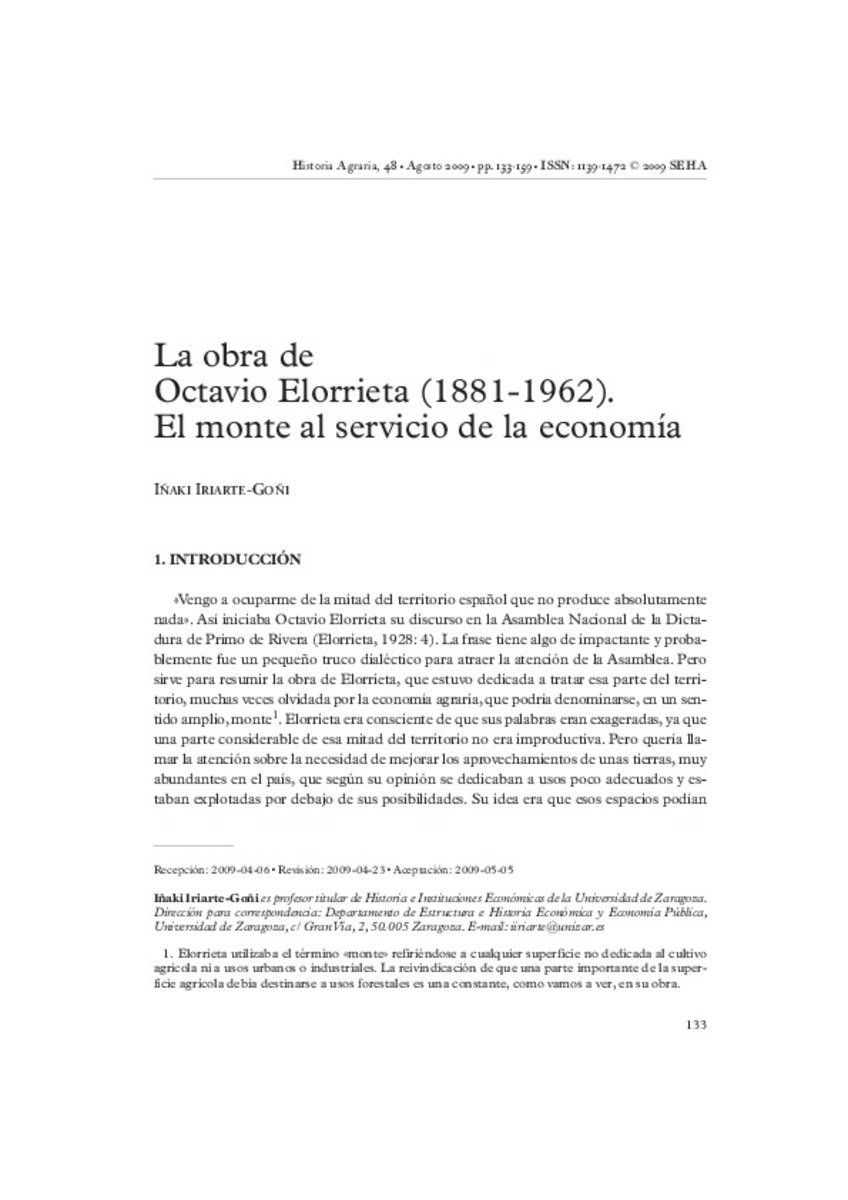Mostrar el registro sencillo del ítem
La obra de Octavio Elorrieta (1881-1962). El monte al servicio de la economía.
| dc.contributor.author | Iriarte Goñi, Iñaki | |
| dc.date.accessioned | 2016-02-05T10:50:03Z | |
| dc.date.available | 2016-02-05T10:50:03Z | |
| dc.date.issued | 2009-08 | |
| dc.identifier.issn | 1139-1472 | |
| dc.identifier.uri | http://hdl.handle.net/10234/148708 | |
| dc.description.abstract | En este artículo se analiza la trayectoria profesional y la obra de Octavio Elorrieta y Artaza, un autor que se convirtió, a través de sus trabajos en torno a la economía forestal española y de los puestos públicos que ocupó, en el ingeniero de montes más influyente de las primeras décadas del siglo XX español. El trabajo se adentra en las propuestas de Elorrieta sobre la explotación forestal, la política forestal y la posible contribución de los bosques a la solución del problema social agrario del sur del país en los años treinta. Y enumera las razones por las que merece la pena leer a este autor en la actualidad. La obra de Elorrieta fue clave a la hora de introducir en España una nueva concepción de los bosques, que pretendía incrementar su producción y garantizar su conservación, aunque ello entrañara el peligro de reducir la visión de estos espacios a sus aspectos más economicistas. | ca_CA |
| dc.description.abstract | This paper analyzes the professional life and the work of Octavio Elorrieta y Artaza, who became, with his works about forest economy and his positions in the Spanish Forest Administration, the most influential forest engineer in Spain in the early 20th Century. The article tackles the proposals of Elorrieta on forest exploitation, forest policy, and the possibilities that the forestland offered towards solving the agrarian social problem in the South of the country in the thirties. It also suggests why it is worthwhile reading this author nowadays. The main conclusion is that Elorrieta played a central role in the definition of a new way of perceiving forest lands; a new perception that, on the one hand, tried to set those areas in an outstanding place of national policy in order to increase their production and to guarantee their conservation, and, on the other hand, it involved the potential danger to reduce the conception of forests just to its bare economic aspects. | ca_CA |
| dc.format.extent | 26 p. | ca_CA |
| dc.format.mimetype | application/pdf | ca_CA |
| dc.language.iso | spa | ca_CA |
| dc.publisher | Sociedad Española de Historia Agraria (SEHA) | ca_CA |
| dc.relation.isPartOf | Historia agraria: Revista de agricultura e historia rural nº 48, p. 133-159 | ca_CA |
| dc.rights | © 2009 SEHA | ca_CA |
| dc.rights.uri | http://rightsstatements.org/vocab/InC/1.0/ | * |
| dc.subject | economía forestal | ca_CA |
| dc.subject | política forestal | ca_CA |
| dc.subject | reforma agraria | ca_CA |
| dc.subject | España | ca_CA |
| dc.subject | forest economy | ca_CA |
| dc.subject | forest policy | ca_CA |
| dc.subject | agrarian reform | ca_CA |
| dc.subject | Spain | ca_CA |
| dc.title | La obra de Octavio Elorrieta (1881-1962). El monte al servicio de la economía. | ca_CA |
| dc.type | info:eu-repo/semantics/article | ca_CA |
| dc.subject.jel | B30 | ca_CA |
| dc.subject.jel | N53 | ca_CA |
| dc.subject.jel | N54 | ca_CA |
| dc.subject.jel | Q23 | ca_CA |
| dc.rights.accessRights | info:eu-repo/semantics/openAccess | ca_CA |
| dc.relation.publisherVersion | http://historiaagraria.com/info_articulo.php?id=489 | ca_CA |







